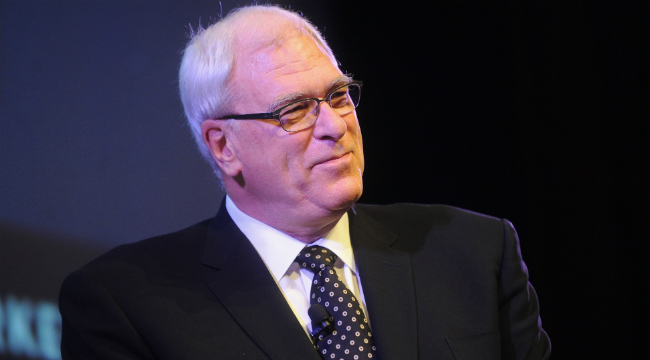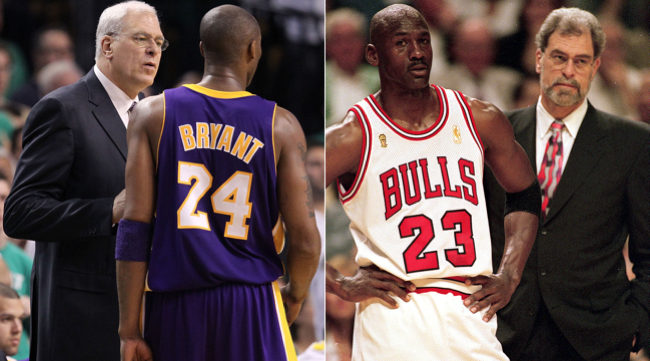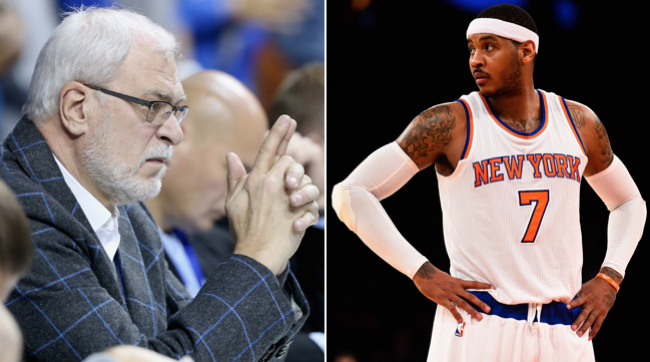
Phil Jackson turned 70 today. Even though he’s been in the NBA since 1969, his unique philosophies on life and basketball have always positioned him as a fresh mind and kept him youthful in the eyes of NBA fans. His Triangle offense may no longer be in vogue (though plenty of its motion principles have been borrowed by teams around the Association), but few coaches in the history of sports have been better motivators, mediators and meddlers than Phil.
To hear Jackson tell it, as he did in his 2013 book Eleven Rings: The Soul of Success, his skill in these areas come from his adherence to Zen Buddhism, and his practice of Eastern philosophies of harmony and selflessness in general. If we were to ask him what he wants for his birthday, our guess would be that he’d ask us to be a little more mindful and study the teachings of Zen. But we still love basketball, just like he does, so let’s study some of the most Zen-like passages from Eleven Rings and see what we can learn from them.
“The most we can hope for is to create the best possible conditions for success, then let go of the outcome. The ride is a lot more fun that way.”
This quote, like a lot of Phil’s, reads as a platitude until you think about just how few people really appreciate what it’s saying. Far too often injuries and circumstance prevent a team that had all the right ingredients from achieving its final goal. Failure in that regard isn’t always a referendum on the process involved.
“The soul of success is surrendering to what is.”
There are certain realities that are better to accept than to fight against. No one lives in a perfect world, and adapting is a more efficient path to improving than attempting to will the world around you to change.
“To hear the unheard,” he said, “is a necessary discipline to be a good ruler. For only when a ruler has learned to listen closely to the people’s hearts, hearing their feelings uncommunicated, pains unexpressed, and complaints not spoken of, can he hope to inspire confidence in the people, understand when something is wrong, and meet the true needs of his citizens.”

You’ve probably heard before how a big part of being a coach is being a psychiatrist. This is a quote originally attributed to third-century Chinese master Pan Ku, but it really hits home when you remember that Jackson coached strong personalities like Kobe and Michael Jordan, and wild cards like Ron Artest and Dennis Rodman. Players are often unhappy about something, and won’t always go to their coach with their problem. Jackson was always skilled at keeping everyone just satisfied enough to work together.
“One thing I’ve learned as a coach is that you can’t force your will on people. If you want them to act differently, you need to inspire them to change themselves.”
Another principle that Jackson practiced expertly in his coaching career. My-way-or-the-highway types like George Karl don’t often seem willing to commit to opening their minds and hearts to people who think differently from themselves. Steve Kerr, who learned under both Jackson and Popovich, brilliantly appealed to a roster that may have never wanted their old coach gone and got players like Andre Iguodala and David Lee to sacrifice for the team’s sake. And he didn’t do it by yelling at them.
“The strength of the team is each individual member. The strength of each member is the team.”
Balance and harmony between the collective and the individual, a wonderful example of Zen thinking. Now that we’ve gotten a picture for how Phil uses his philosophy to be a leader, what about on the basketball court?
“[The] triangle offense… aligned perfectly with the values of selflessness and mindful awareness I’d been studying in Zen Buddhism.”
Selflessness: Passing the ball quickly and moving, giving up your individual shot for a better one. Mindful awareness: Precise motion and spacing, to make sure that your teammates have the room needed to make their plays and the defense can’t focus too much on any one area. The geography of a half-court offense has shifted outward since Phil’s Triangle started dominating the league, but selflessness and mindful awareness have been hallmarks of successful basketball teams since (at least) the Knicks teams of which Jackson was a part in the early ’70s. The Triangle offense just enforces those principles in its structure, which is why Phil is so fond of it.
“[T]he best way to get players to coordinate their actions was to have them play the game in 4/4 time. The basic rule was that the player with the ball had to do something with it before the third beat: either pass, shoot, or start to dribble. When everyone is keeping time, it makes it easier to harmonize with one another, beat by beat.”
Fluid, team basketball has been compared to beautiful music by many pundits, but rarely in such specific terms. Phil may not be on the sidelines for the Knicks now, but he’s still attempting to implement the Triangle with Derek Fisher, so we’ll see if Carmelo Anthony finally hits that third beat more regularly in Year 2 of the system.
“But theres only so much a player can absorb when his body is pulsing with adrenaline. This is not a good time for deep left brain discussion. It’s the moment to calm the player’s minds and strengthen their spiritual connection with one another before they head into battle.”
Some of the most confident motivators in the NBA (Doc Rivers, Popovich, Jackson back in the day) keep their timeouts and pregame huddles succinct. They often ignore strategy completely just to reinforce the team’s sense of each other and the goal at hand. This passage is a perfect distillation of why it works.
“Basketball takes place at such a lightning pace that it’s easy to make mistakes and get obsessed with what just happened or what might happen next, which distracts you from the only thing that really matters — this very moment.”

When a player is truly in the moment, or as plenty of people call it, “in the zone,” it’s obvious. Muscle memory takes over, everything works. Of all the advice Phil has dropped, this one might be the toughest to put into practice. Meditation, of which Phil is a huge advocate, is great practice for blocking out what was and what will be to focus on what is.
“Approach the game with no preset agendas and you’ll probably come away surprised at your overall efforts.”
This is nearly as difficult to do as getting in the zone. “Agendas” is tough to define here, but we can probably guess that Phil means anything beyond doing your individual best from moment to moment. Notice how Phil never says the word “winning” once in all of these quotes. Winning matters, of course, but to focus too much on it is to look ahead and miss the now. Knicks fans should take this message to heart as their team slowly builds this season. Without expectations, they might be a fun team this year. Don’t spoil it by putting a deadline on success.






